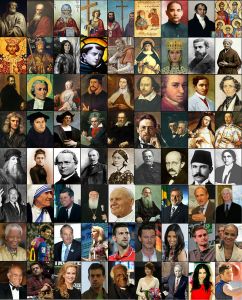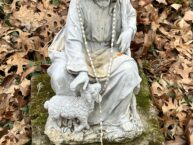
By Jobas , CC BY-SA 4.0, Wikimedia Commons
November 1, 2020 – The Feast of All Saints: May God’s words be spoken, may God’s words be heard. Amen.
Today we celebrate the principal feast of All Saints, and I think this part of the passage from the book of Revelation that we heard earlier makes it clear who we mean by saint, as the author describes those gathered before God, saying “…there was a great multitude that no one could count, from every nation, from all tribes and peoples and languages…”
All Saints reminds us that everyone who follows Christ – people of all nations, tribes ,and languages – everyone are saints. We have often relegated this title to folks who walked with Jesus before his crucifixion, like St. Peter or St. Mary Magdalene. But our book of saints tells us of others closer to our time who also walked with him: Mother Teresa, the Dorchester Chaplains, Constance and her companions (known as the Memphis Martyrs), the Rev. Dr. Martin Luther King, Jr., Dorothy Day, Archbishop Oscar Romero, Justice Thurgood Marshall, Harriet Beecher Stowe, and so many more. Men and women who truly were from every walk of life, nation, and language – some who died for the faith, and all who offered up their own life in service to the end of their life on earth.
Still, we tend to elevate all of them to some sort of superstar status – unattainable, out of reach, to be revered, and without blemish. Nothing could be further from the truth. In the preface to one the book of saints from a few years ago “Holy Women, Holy Men,” made clear that perfection is not the qualifier for wearing the Big S on our chest – in this case it stands for Saint, not Superman…In the preface it says, “In these saints we encounter not models of absolute perfection but men and women whose lives, with all their diversity of gifts and graces, were reshaped by God’s redemptive activity. May we take heart as we realize that, in spite of their failings and ours, we are all alike, redeemed sinners called to be saints…”
All Saints’ isn’t about perfect people who have died, it is about recognizing that God asks ordinary people do extraordinary things: One of my favorite hymns for All Saints, that we sadly are not singing today, is “I sing a song of the saints of God,” #293 in our Hymnal. One of the verses of that hymn says it all: “The world is filled with living saints, who choose to do God’s will, You can meet them in school, on the road, or at sea; In church, in a train, in a shop, or at tea; for the saints are folk like you and like me, and I mean to be one, too.”
All Saints is a celebration of the sainthood to which all of us are united – one to another – the living saints and the dead – knit together into the communion of saints, and to which all of us are called. It is about everyone of you – the saints militant, as the church describes those of us still here in this earthly plane, as much as it is about the saints triumphant – those beloved who have gone to glory.
So, if we are saints by our faith in Jesus Christ, and we are called to this earth bound saintly life, what exactly does that mean for us? Even if we know that we don’t have to be perfect, or pious beyond reproach, what does it mean then to be a saint today – what does that require of us? Jesus gives us the answer in the gospel passage we heard.
Ahhh, those beatitudes found in the gospel of Matthew, which we heard, and a slightly different take in the gospel of Luke…we can also find them framed on walls, embroidered on pillows, and parts of it even tattooed on arms. Sure, it is comforting to hear that the meek will inherit the earth, particularly in these horrifying days, but let’s step back first to see who it was Jesus was speaking to, because this context helps us to understand what it is that Jesus is really saying, and what that means for those listening then, and for us today.
In the verses before these, it said that Jesus was traveling all over Galilee teaching and healing, so that he was known all through Syria. People were bringing “those afflicted with various diseases, demoniacs, epileptics, and paralytics.” He was surrounded by a great crowd from all over the region. So when he sat down to teach again, it wasn’t just to his disciples, but to all those multitudes – including all those who were sick, which in those days meant they were outcasts, the poor, the oppressed. This is who he is speaking to in that moment. Those who were in need in ways visible, and deep within.
So, when he begins with “Blessed are the poor in spirit, for theirs is the kingdom of God…” this was not what they were expecting. Most of them likely didn’t feel very blessed at all, but they sure were poor in spirit (or as Luke puts it – poor in any other way), and mournful for their condition and that of those they loved. And in these troubling days, perhaps we too could place ourselves among those in the crowd that day – more than 230,000 people, some of who we know personally, dead from COVID-19, as cases continue to rise faster than ever before; yet another black man, Walter Wallace, Jr., shot by police – this time in Philadelphia; climate change catastrophes abound in wildfires and violent storms worldwide; another terrorist attack in a church – this time in France; millions remain out of work as winter draws near; and an election season filled with reminders of the racism, sexism, heterosexism, and xenophobia that has darkened the hearts of so many in our nation. We are a dispirited and mournful people – poor in heart and pocket. And so today, we are gathered together and listen to these words of Jesus. What do we hear?
What if I were to tell you that this opening to the Sermon on the Mount was not meant to just give us hope that all will be well in some later time of God’s choosing. How would it change for you to hear that God’s choosing is now. Now is the time, and we have a part to play in it! The key is to pay attention to the first two verses.
Jesus begins by saying “Blessed are the poor in spirit, for theirs is the kingdom of heaven. Blessed are those who mourn, for they will be comforted.” In those two verses he gives us first the time, and the act, by which all the rest will take place. We know that when Jesus talks about the Kingdom of God or Heaven, he wasn’t talking about some future time or place, but here – now – anytime he is present! And if we look at the Greek for the word translated as comforted, it is the same as used when Jesus describes the one who will be sent after his ascension, the Paraclete, the comforter, (παρακληθήσονται). But that word also means Advocate, particularly to those hearing this in that first century, it was a word that meant the one who will stand in the court on behalf of others.
Or put another way, at the beginning of Jesus’ ministry, he is telling the people that those who mourn will no longer stand alone – that they will have an advocate to stand by them. One could say that it is God who will do this, who will be the advocate, but as we should know about God by now, that isn’t how the Almighty likes to do things, is it? God chooses to work through us, with us, as partners to bring about the dream of God for all creation. So those advocates – they were sitting right in front of Jesus that day. And they are the ones who hear these words today too. And nothing for them, or for us, will ever be the same.
The beatitudes are about transformation, not just of the world, but of ourselves – a transformation that is life giving – but begins in vulnerability. For it is when we are poor in spirit, when we mourn in pain for those we lost, or what we see happening in the world, that is when Christ’s light seeps through the cracks of our soul to give life to our beating heart, and we hunger and thirst for righteousness. That is where we will find the comfort we seek.
For when we mourn, there we will feel God most near, standing by us until we feel stronger, until through our brokenness, we become bearers of that unbounding love and grace to others, and in their eyes encounter Christ once more in the least, the last, the lonely, and the lost.
The blessed becoming the blessing.
The beatitudes aren’t platitudes – they are a promise and an invitation to all of God’s children.
They are a promise that we will never be abandoned in our sorrow, but will always be given comfort in God’s love and grace, ever present with us.
They are an invitation to all the saints – the people of all nations and languages – to live the life we are called to live – to hunger and thirst for righteousness so much that we will not rest until we change the world, and bring about the beloved kingdom of God!
They are about You! Every single one of you are the ones Jesus is talking about. You are the ones who will be blessed and bless others – who will comfort those who mourn, and be comforted. And if there was ever a time since that Sermon on the Mount when the world needs us to rise up and be the saints we are called to be, it is now.
One of those saints I mentioned earlier, the Rev. Dr. Martin Luther King, Jr. once wrote from his jail cell in Birmingham Alabama to ministers, including some in our own Episcopal Church, who were reluctant to stand against the racism in our country. In that famous letter, he said, “There was a time when the church was very powerful — in the time when the early Christians rejoiced at being deemed worthy to suffer for what they believed. In those days, the church was not merely a thermometer that recorded the ideas and principles of popular opinion; it was a thermostat that transformed the mores of society… If today’s church does not recapture the sacrificial spirit of the early church, it will lose its authenticity, forfeit the loyalty of millions, and be dismissed as an irrelevant social club with no meaning…”[1]
What Dr. King is making clear is that if we, the body of Christ today, do not respond to the gospel in our lives, and in the world, we need not worry about church growth, stewardship plans, or our beloved building, for we are already dead. If the main reason we come to church is to be comforted by the love of our fellow parishioners, but not because we hunger and thirst for righteousness that moves us to bring the unconditional love of God into the world, we have already become the social club Dr. King warned about. The church must reclaim our gospel mission, our beatitude call. For when we mourn the state of our lives and our world, God comforts us through our mission and ministry to change what is, to what may be.
When we mourn children torn from their mother’s breast and put into cages – we will find comfort in our fight against oppression!
When we mourn the racist killing of people for the crime of being black or brown, we will find comfort as we march for justice!
When we mourn the sexual assault, harassment, and killing of our sisters, we will find comfort as we advocate for overturning our systemic misogyny!
When we mourn the bullying and murder of LGBTQ+ people, we will find comfort in standing by them till they are free to be who they were born to be!
When we mourn the poor and homeless, we will find comfort as we turn the tide of economic absurdity on its head!
When we mourn the addicted, the depressed, the sick, and the dying, we will find comfort as we advocate for their access to healthcare as a right, not a privilege!
When we mourn for all of creation as it groans from the weight of our neglect and abuse, we will find comfort as we stand boldly against the greed and arrogance of humanity to protect the earth and all who dwell on it.
We are the saints militant – the church – the body of Christ alive, united for all eternity with those before in the communion of saints, but it comes with an invitation…
Jesus is inviting us into a life of transformation – a beatitude life. Will we accept the invitation?
Long ago a saint waited in a jail cell in Alabama for an answer from the church to that very question.
What is our answer today?
What is our answer, because while we have come far in the days since, the dream has not yet been realized – not only King’s dream – but the very dream of God for us all.
The world still hungers and thirsts for righteousness!
So my sisters and brothers, we must say yes! We must, because we need to always claim our humble role as saints, healers of the earth, for our time and place. Grateful for the example of courage we have been given by those who have gone before us, transforming our world, as we ourselves are transformed from our mourning into the comfort of others in Christ’s name.
As we the blessed, become a blessing.
Amen.
[1] Martin Luther King Jr., “Letter from a Birmingham Jail”.
For the audio from the 10:30am service, click below, or subscribe to our iTunes Sermon Podcast by clicking here:
Rev. Diana L. Wilcox
Christ Church in Bloomfield & Glen Ridge
November 1, 2020
All Saints Sunday
1st Reading – Revelation 7:9-17
Psalm 34:1-10, 22
2nd Reading – 1 John 3:1-3
Gospel – Matthew 5:1-12






